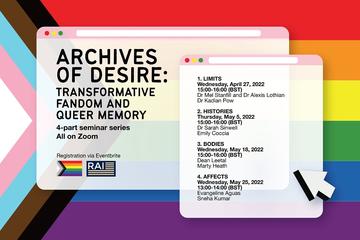Archives of Desire: Transformative Fandom and Queer Memory – 3. Bodies
Dean Leetal
Marty Heath

Archives of Desire: Transformative Fandom and Queer Memory
4-part seminar series, All on Zoom
Registration via Eventbrite
This free seminar series is premised on the idea that online fan spaces archive queer desires.
Transformative fandom (where fans adapt pre-existing, copyrighted media properties to create their own artworks, stories and videos) has been theorised as:
a) innately memorialising – recording how individual fans feel about the media they consume, and
b) structurally queer – troubling gender and sexuality norms.
This series asks what happens when we view fan works, and the digital spaces in which they circulate, as records of contemporary LGBTQIA+ cultural memory.
- Who is included or excluded in this type of memorialising?
- How does race, gender identity and privilege shape fan archives and the histories they document
- What kinds of feelings do these repositories preserve, generate or share?
- How do they relate to other forms of queer remembering?
Join our incredibly line-up of fan scholars this Trinity term, as we explore these ‘Archives of Desire’! All events free to attend and open to the public.
Seminar 3. BODIES
Dean Leetal
Genders outside of the binary have been largely erased from fan studies research. But this erasure has not been completely successful. This work suggests that they appear, unnamed, in the very research that denies them – as well as in the subtext of fan favorite characters. This paper briefly revisits some classic fan studies research to demonstrate the transness embedded in it. This includes works by Kustritz, Bacon-Smith, and Somogyi. It then more closely examines a fan favorite character, Dean Winchester of the Supernatural show and fanworks. Previous research has generally framed Dean as an absolute manly man, or as a feminine pseudo-woman. This work suggests that both are true, and are both essential for Dean’s gender characterization. Moreover, it suggests that Dean is additionally characterized in genders from queer cultures. This gender multiplicity itself is a form of non-binary gender demonstrating another way in which gender outside of the gender binary has existed for a long while in fan fiction spaces. Methodologically, the research implemented Thematic Text Analysis as well as Close Reading. This paper also used fan studies research to reconsider Judith Butler’s gender creation model. Through this mutual reexamination, this work suggests ways in which Butler’s model may allow genders outside of the binary. Moreover, it illuminates a decades-long practice in fan communities, that may be bringing these genders into the world – or perhaps creating new nonbinary genders.
Bio
Dean has recently completed their master’s degree in gender studies. Their research won the Zafrir and the Ze’evi as well as a departmental award for excellence. Ze published a paper about alternative disability activism, based in fan fiction and in care ethics. Ze is in the process of publishing several works about trans and non-binary representation in novels and television. Ze is a TA and research assistant, as well as a dissertation advisor at Bar Illan University. They’ve been queer / trans activists since being a teenager, the first out genderqueer and organizer of the first genderqueer group in their country of origin.
Marty Heath
Based on my interest in how stories are adapted to new media, I will be discussing what fan fiction reveals about how disability is reified or minimized in queer fandom. In particular, I’m going to focus on which bodies (raced, gendered, and (dis)abled), are viewed as desirable and taken up by fandoms as popular ships. Using the popularity of various ships on A03 as a gauge of which pairings are favoured within their respective fandoms, I will demonstrate that the trope of the “tortured white man” is the most accepted depiction of disabled queerness. Towards this end, I will include examples of popular disabled pairings from the Hunger Games, Marvel, and Roswell NM fanfic communities. In contrast, I find that POC are not viewed as nearly as sexually viable by fanfic shippers, who are more likely to accept disabled or trans characters in white-white pairings than support pairings which feature non-white characters. I argue that the popularity of the Magnus/Alec ship from Shadowhunters is in fact the exception which proves this rule. Finally, I will discuss how some disabilities are more readily accepted than others, and how those preferences reflect a hierarchy of disability which is reified by the way that disabilities are presented in fanfiction.
Bio
Marty Heath, who uses they/them pronouns, is a student from the University of Illinois at Chicago working towards their PhD in Communication and a Certificate in Disability Ethics. Much of Marty’s research has explored how the process of adaptation reveals the strengths and limitations of various storytelling mediums. This includes examinations of how the norms of different genres and platforms dictate certain changes to the plot, individual characters, and even worldbuilding. As a queer, disabled person, Marty has become increasingly interested in the embodiment of hierarchies of power from the (in)visibility of various disabilities, to the notion of passing, and where non-normative bodies are presented as either sub- or super-human.



